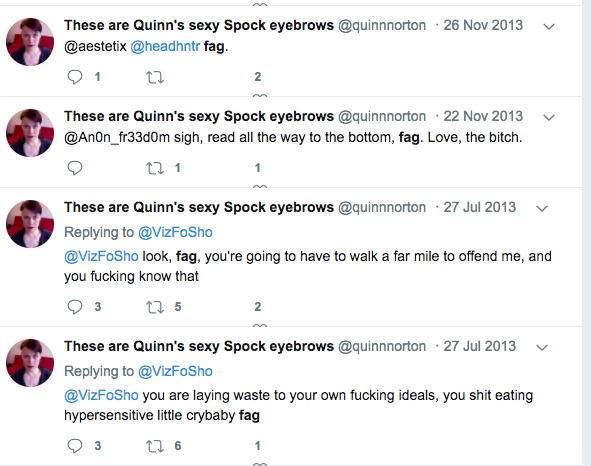The newest hire for The New York Times editorial board wasn’t able to celebrate her first day on the job.
Hours after Quinn Norton was announced as the paper’s lead opinion writer on technology, the Times reported that Norton wouldn’t be taking the job.
“No harm no foul. I’m sorry I can’t do the work I wanted to do with them,” Norton tweeted. “I wish there had been a way, but ultimately, they need to feel safe with how the net will react to their opinion writers.”
Immediately after the Times’ first announcement, Norton’s history and acquaintances became a focus of criticism. Norton has written for Wired, ProPublica and The Atlantic — and delivered glimpses into her personal life.
Case in point: In 2013, Norton wrote about her “patron saint of moral complexity” — John Rabe, a Nazi who saw Hitler as a hero.
“For me there is only this in the story of John Rabe: there are no clear bad guys or good guys in humanity,” Norton wrote. “There is just an uncomfortable pause, where you can let history crowd in on you. The best you can do is be quiet in the face of the terrible contradictions, and try to figure out what the next right thing is.”
Norton also wrote a lengthy Medium post about her relationship with Andrew Auernheimer, known as Weev, who helped run the Daily Stormer, an infamous white supremacist website. “I must say at once that this man is someone I count as a friend,” she wrote.
Quinn’s past Twitter use came under heavy scrutiny and criticism after the news of her appointment broke. Twitter users found she had used offensive language, like tweeting the word “fag” against what appeared to be trolls.
Norton casually tweeted the word “ni**er” too, as Huffington Post reporter Ashley Feinberg pointed out.
what pic.twitter.com/3JdAMauwxa
— Ashley Feinberg (ashleyfeinberg.bsky.social) (@ashleyfeinberg) February 13, 2018
Norton struggled to define her use of offensive language in a series of Twitter posts on Tuesday evening, writing, “I’ve been a queer activist since 1992. But when I speak to communities, I used their language to do it.”
Things did not get better for Norton after that.
Here is the new New York Times editorial board member’s Medium post about her friendship with, and inability to be objective about, the Nazi activist Andrew Auernheimer. https://t.co/VYxI7ZWAJk https://t.co/lmKsGRv9DX
— southpaw (@nycsouthpaw) February 13, 2018
friends with Nazis but don't agree with them pic.twitter.com/76KW3WcjQR
— catturd2.bsky.social (@thetomzone) February 13, 2018
After the Times’ terse announcement around 10 p.m. on Tuesday that Norton and the paper had “decided to go our separate ways,” Norton then expended several tweets searching for a larger meaning behind the sudden reversal of fortune.
This incident follows a number of other Times-centric controversies in an era when many on the left feel that previously forbidden political ideas have been normalized and “both-sides-ism” — the precept that all ideas are worth hearing — has debased public discourse. The Times took considerable flak for hiring Bret Stephens, a conservative who has argued against climate change. The newspaper of record also employed staff editor Bari Weiss, who was widely criticized for a recent tweet describing U.S. Olympic figure skater Mirai Nagasu as an “immigrant.” (Nagasu was born in California.) Weiss responded by suggesting that she was a victim of persecution and that “civilization” was under attack, rather than her ignorance or cluelessness.
Do you need another sign of civilization's end? Here's one: I tweeted "Immigrants: we get the job done" with a video of Mirai Nagasu's triple axel. The line is a Hamilton reference. I know she was born in Cali. Her parents are immigrants. I was celebrating her and them. (1/2)
— Bari Weiss (@bariweiss) February 12, 2018
All in all, it hasn’t been an outstanding week at the Times, and it’s only Wednesday.


